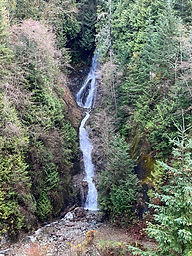Massive Increase in Numbers an 'Epochal Change': Buhr
It's mid-summer, and The Watershed hopes all our readers are catching a few rays and enjoying some down time. Nevertheless, the news never sleeps, and we're not ones to allow significant information to slip past unremarked.
The July 19 edition of 'Council in Focus' summarized Public Works Manager Karl Buhr's reports to Council. Buhr has jumped into this new position at the deep end, and in fact presented Council with no fewer than six separate reports at the meeting, not including the completion of the Disaster Mitigation Fund grant, the application and submission of which he also oversaw.

But it was the hiker count that drew The Watershed's attention. The attached charts, pulled from Buhr's report, paint a stark picture of the rise in hikers traversing the Lions Bay watershed. While the numbers still clearly fall below the 2,000/month value in the deep winter months, this is no longer the case the rest of the year. The busiest months of 2022 were July and August, peaking at nearly 7,000 hikers in August alone. But this year, the Village watershed saw visits from more than 8,000 hikers for the month of June, and at last count, July was on track to have more than 14,000 trekkers.
These numbers are astonishing. And they have implications on a number of fronts, including parking and traffic impacts on infrastructure that was never built to sustain this kind of pressure. "Lions Bay visitor parking demand should be expected to increase, year upon year," says Buhr in his report. (The full report can be read HERE in the agenda package, beginning on page 47.) However, Buhr's view that "the current plan is now working, to the limited extent the Village can now handle the numbers of summer visitors we now see," is in dispute, at least by some residents of Bayview, Mountain and Sunset Drives who regularly report traffic snarls and parking infractions to The Watershed. In his report, Buhr calls the changes in parking demand 'epochal' and notes that Village staff are exploring a number of solutions.
Perhaps even more worrisome is the implication that the three over-worked porta-potties at the trailhead can even hope to meet the demands of the number of hikers. At the July 19 meeting, Buhr spoke of the need to create some kind of toilet facilities for hikers out at Tunnel Bluffs, as the evidence of hikers leaving fecal deposits behind is indisputable.

The chart breaking down hiker numbers by days of the week clearly indicates that weekends show the highest trail usage, with more than 600 hikers per day heading to Tunnel Bluffs alone, let alone those headed up Mount Harvey or the Lions. And as reported in our series discussing Village water infrastructure issues , most of the surrounding municipalities and regional districts have protected watersheds, but Lions Bay does not. Since the watershed is not closed to the public, the central concern is fecal matter and other coliforms making their way via hikers (and their dogs) into the water supply. While these neighbours also have filtration as a critical part of their water treatment, again, Lions Bay does not.
An 'epochal' problem indeed, and foreseen or not, one that is hurtling toward the village much faster than anyone expected.
A note from the editor: In the August 4 edition of the Village Update, Buhr stated that actual hiker numbers for July were "lower than the 14,000 extrapolated from one week’s data at the beginning of the month, but still well over 10,000 individual visitors to backcountry trails originating in Lions Bay."
Do you have concerns about the implications of hikers in and around Lions Bay?
The Watershed values your opinion. Leave a comment below, or email us at editor@lionsbaywatershed.ca


I recognize Norma’s concerns but it fills my heart to see more and more people of all backgrounds enjoying the Tunnel Bluffs trail. I think we have to accept that its popularity will grow as the population of Metro Van grows and plan accordingly. I think approaching the Ministry of Transportation to create a parking lot at the gravel pit would be a good compromise plus investigating the installation of composting toilets at multiple locations along the route. There’s a good hikers‘ parking lot on the upper turnoff before Porteau Cove and composting toilets along the trails accessed from there - I think those could be good models.
One part of Buhr's report on hiking mentioned asking the ministry to give us access to the gravel pit area above Brunswick to create more parking for hikers! We don't need more hikers in our watershed with their garbage and human waste. I have opposed this idea to Council.